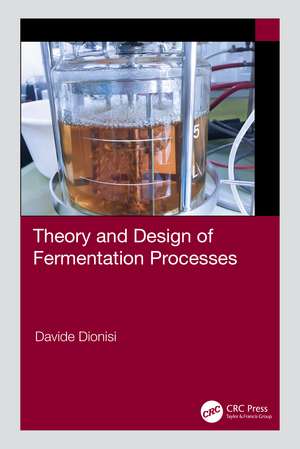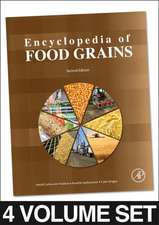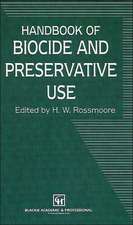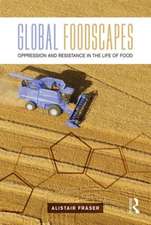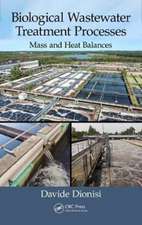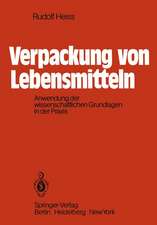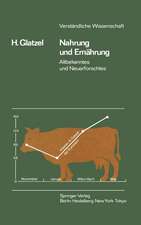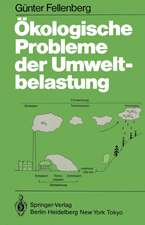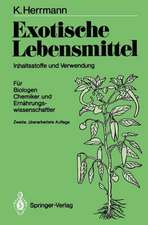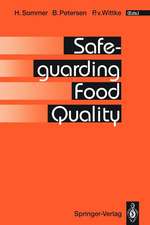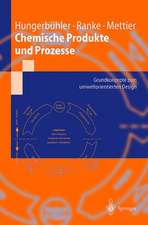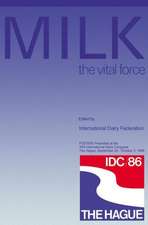Theory and Design of Fermentation Processes
Autor Davide Dionisien Limba Engleză Paperback – 7 oct 2021
Features
- Uses chemical engineering principles for the study of fermentation processes
- Provides detailed coverage of stoichiometry and kinetics of fermentation processes
- Discusses pertinent oxygen transfer theory and its applications
- Concisely covers microorganism biochemistry and metabolism
- Includes solved examples and problems with solutions
| Toate formatele și edițiile | Preț | Express |
|---|---|---|
| Paperback (1) | 432.87 lei 6-8 săpt. | |
| CRC Press – 7 oct 2021 | 432.87 lei 6-8 săpt. | |
| Hardback (1) | 673.09 lei 6-8 săpt. | |
| CRC Press – 7 oct 2021 | 673.09 lei 6-8 săpt. |
Preț: 432.87 lei
Nou
Puncte Express: 649
Preț estimativ în valută:
82.84€ • 86.17$ • 68.39£
82.84€ • 86.17$ • 68.39£
Carte tipărită la comandă
Livrare economică 14-28 aprilie
Preluare comenzi: 021 569.72.76
Specificații
ISBN-13: 9781032108322
ISBN-10: 1032108320
Pagini: 278
Ilustrații: 210
Dimensiuni: 152 x 229 x 15 mm
Greutate: 0.38 kg
Ediția:1
Editura: CRC Press
Colecția CRC Press
Locul publicării:Boca Raton, United States
ISBN-10: 1032108320
Pagini: 278
Ilustrații: 210
Dimensiuni: 152 x 229 x 15 mm
Greutate: 0.38 kg
Ediția:1
Editura: CRC Press
Colecția CRC Press
Locul publicării:Boca Raton, United States
Cuprins
1. Introduction to fermentation processes. 2. Kinetics and stoichiometry. 3. Mass balances and design for batch, continuous and fed-batch reactors. 4. Oxygen transfer. 5. Heat generation and heat balances. 6. Design summary and examples of industrial fermentation processes.
Notă biografică
Dr Dionisi is Reader in Chemical Engineering at University of Aberdeen, Scotland, UK, where he teaches biochemical engineering, wastewater treatment and energy from biomass in undergraduate and postgraduate programmes in chemical engineering and renewable energy. Dr Dionisi is also co-ordinator of the MSc programme in Renewable Energy Engineering. Dr Dionisi’s research interests are focused on the application of chemical engineering principles to the development of improved, more sustainable, and environmentally friendly processes, with particular focus on renewable energy and biological processes with open mixed cultures. Current areas of research are the following: - innovative processes for chemicals and energy production from lignocellulosic biomass and organic waste; - biological wastewater treatment: process optimisation aimed at minimisation of reactor volume and energy consumption and maximisation of energy recovery through combination of aerobic and anaerobic processes; biodegradation of xenobiotics. Dr Dionisi has obtained research funding for over £1M. Dr Dionisi has published 57 papers on international peer-reviewed journals which have received over 2,300 citations and his h-index is 25. Dr Dionisi has also published 1 book, 2 book chapters and 2 patents and has over 60 papers or abstracts published as conference proceedings. He has reviewed papers for over 50 international scientific journals, for various conferences and research proposals for several organisations. Dr Dionisi is in the Editorial Board of the journal "Process Safety and Environmental Protection" and in the Topics Board of the journal “Processes”. Dr Dionisi obtained his degree in Chemical Engineering (1997) and PhD in Industrial Chemical Processes (2001) from Sapienza University, Rome. Since 2001 Dr Dionisi has worked at Sapienza University (2001-2007) as Postdoc and Lecturer in the School of Mathematical, Physical and Natural Sciences, for Syngenta (2007-2012) as Process Engineer/Principal Process Engineer, and since 2012 for University of Aberdeen, School of Engineering.
Professor Davide Dionisi is Personal Chair in Chemical Engineering at University of Aberdeen, Scotland, UK. Professor Dionisi obtained his MEng in Chemical Engineering and PhD in Industrial Chemical Processes from the School of Engineering, Sapienza University, Rome, Italy. Between 2001-2003 Prof Dionisi worked as a Post-Doctoral Research Assistant for the School of Mathematical, Physical and Natural Sciences at Sapienza University, before entering the same School as Lecturer in 2004. In 2007 Prof Dionisi joined Syngenta’s Process Studies Group in the UK, as Process Engineer and then Principal Process Engineer. Prof Dionisi joined University of Aberdeen as a Lecturer in Chemical Engineering in 2012.
Prof Dionisi’s research interests are focused on the application of chemical engineering principles to the development of improved, more sustainable and environmentally-friendly processes, with particular focus on biological processes with open mixed cultures. Prof Dionisi has published over 50 papers on international peer-reviewed journals which have received over 2,500 citations and his h-index is 25. Prof Dionisi has also published 2 books, 2 book chapters and 2 patents and has written many internal industrial documents on various chemical engineering topics. Prof Dionisi has supervised to successful completion 5 PhD students and has obtained research funding for over £1M.
At University of Aberdeen, Prof Dionisi teaches biochemical engineering, wastewater treatment and energy from biomass in the undergraduate programme in Chemical Engineering and in the postgraduate programme in Renewable Energy Engineering, which he also co-ordinates. Prof Dionisi has supervised over 50 undergraduate and postgraduate students in their individual projects.
Prof Dionisi’s research interests are focused on the application of chemical engineering principles to the development of improved, more sustainable and environmentally-friendly processes, with particular focus on biological processes with open mixed cultures. Prof Dionisi has published over 50 papers on international peer-reviewed journals which have received over 2,500 citations and his h-index is 25. Prof Dionisi has also published 2 books, 2 book chapters and 2 patents and has written many internal industrial documents on various chemical engineering topics. Prof Dionisi has supervised to successful completion 5 PhD students and has obtained research funding for over £1M.
At University of Aberdeen, Prof Dionisi teaches biochemical engineering, wastewater treatment and energy from biomass in the undergraduate programme in Chemical Engineering and in the postgraduate programme in Renewable Energy Engineering, which he also co-ordinates. Prof Dionisi has supervised over 50 undergraduate and postgraduate students in their individual projects.
Descriere
This book covers the kinetics and design of fermentation processes, defined in the broader sense as any industrial processes that use living microorganisms or cells, both under aerobic and anaerobic conditions. It starts with a concise introduction to microbes and their metabolism, followed by rate equations, stoichiometry, derivation and use of mass balances for the design processes. It covers oxygen transfer and mass balances, heat transfer and design and scale-up/scale-down of fermentation processes. It further includes industrially relevant process examples, over 100 solved examples, questions and problems, and solutions of differential equations and systems of equations in Excel.
